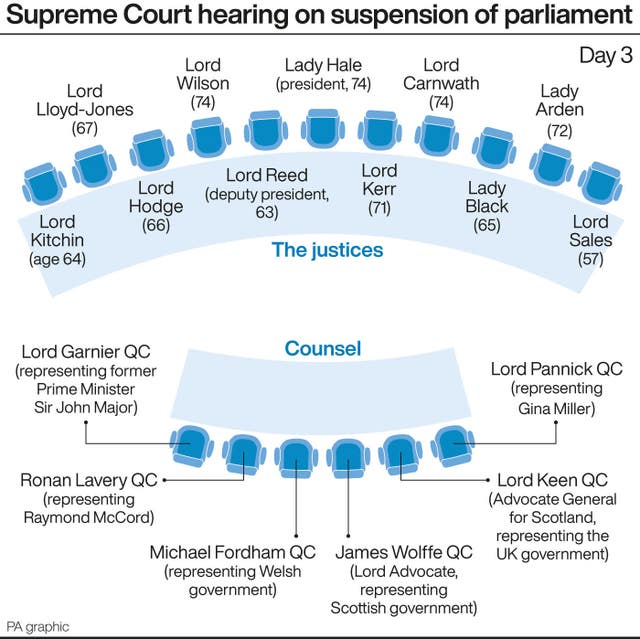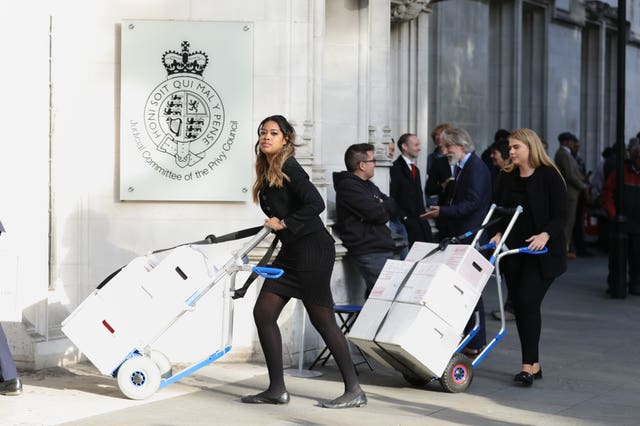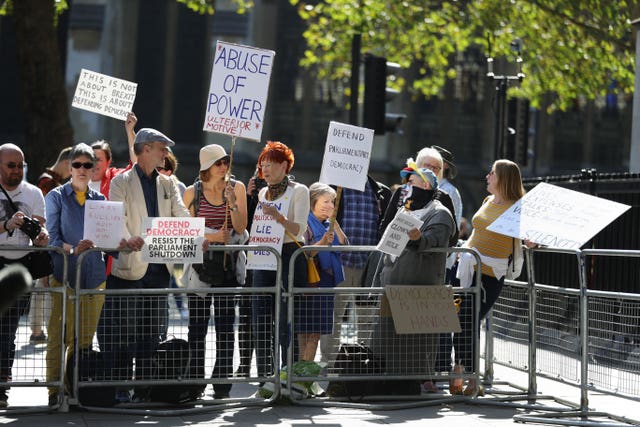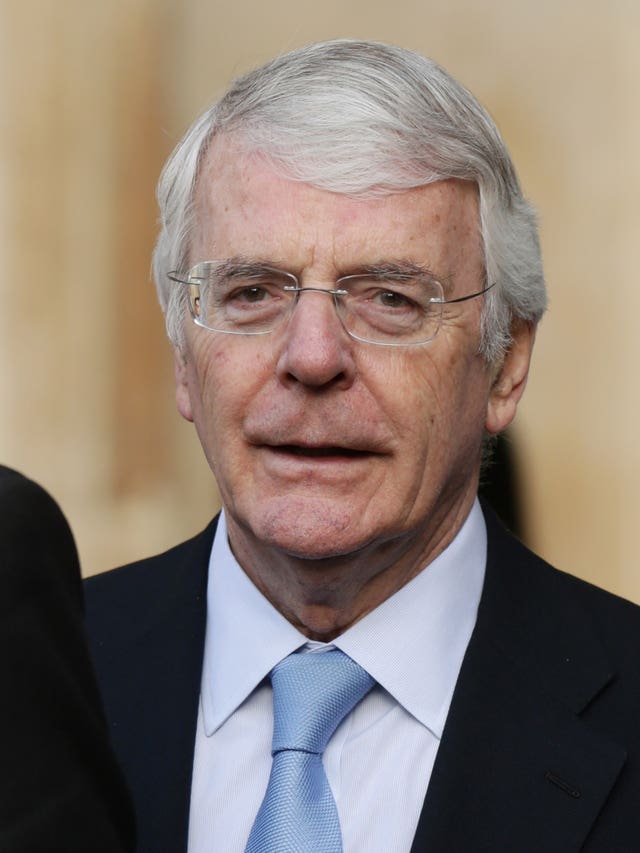Boris Johnson awaits historic ruling over prorogation of Parliament
The Supreme Court in London has been asked to determine whether the prorogation move was unlawful.

Prime Minister Boris Johnson faces a wait for a ruling from the UK’s highest court over his advice to the Queen to suspend Parliament for five weeks.
The Supreme Court in London has been asked to determine whether the prorogation move – which has closed down Parliament until October 14 – was unlawful.
A panel of 11 justices heard appeals over three days arising out of separate legal challenges in England and Scotland, in which leading judges reached different conclusions.
At the close of the unprecedented hearing on Thursday, the court’s president Lady Hale said the judges hope to give their decision early next week.
She said: “I must repeat that this case is not about when and on what terms the United Kingdom leaves the European Union.
“The result of this case will not determine that. We are solely concerned with the lawfulness of the Prime Minister’s decision to advise Her Majesty to prorogue Parliament on the dates in question.
“As we have heard, it is not a simple question and we will now carefully consider all the arguments that have been presented to us.”

Depending on the legal basis upon which the judges reach their conclusions, Parliament may have to reconvene if Mr Johnson – who has refused to rule out a second suspension – loses the case.
Documents submitted to the court revealed three possible scenarios in the event the court rules the suspension was unlawful, two of which could see the Prime Minister make a fresh decision to prorogue Parliament.
The other outcome could see the court order Parliament to be recalled, but Mr Johnson’s lawyers urged the judges to consider the “very serious practical consequences” involved in this option, as it would require a new Queen’s Speech and State Opening of Parliament.

Lawyers for Mr Johnson’s opponents said Parliament should meet “urgently” after the ruling to decide what to do in the event the prorogation is declared “null” by the court.
Asked shortly after the hearing ended to rule out proroguing Parliament for a second time, Mr Johnson said: “I have the greatest respect for the judiciary in this country.
“The best thing I can say at the moment whilst their deliberations are continuing is that obviously I agree very much with the Master of the Rolls and the Lord Chief Justice and others who found in our favour the other day.”
He added: “I will wait to see what transpires.”
The ruling could come at a sensitive time for the Prime Minister as he makes his debut appearance at the United Nations general assembly in New York.
Mr Johnson is in the United States from Monday to Wednesday and is expected to use the trip to hold meetings with key players in the Brexit process including German leader Angela Merkel and European Council president Donald Tusk.
The timing could also prove difficult for Labour MPs attending the party’s annual conference in Brighton.
The appeals are against rulings in London and Edinburgh – which produced different results.
At the High Court in London, Lord Chief Justice Lord Burnett and two other judges rejected campaigner and businesswoman Gina Miller’s challenge, finding that the prorogation was “purely political” and not a matter for the courts.
But in Scotland, a cross-party group of MPs and peers led by SNP MP Joanna Cherry QC won a ruling from the Inner House of the Court of Session that Mr Johnson’s prorogation decision was unlawful because it was “motivated by the improper purpose of stymieing Parliament”.
Mrs Miller is appealing against the decision of the High Court, asking the Supreme Court to find that the judges who heard her judicial review action “erred in law” in the findings they reached.
In his closing remarks to the judges, her barrister Lord Pannick QC said: “The remedy we seek from the court is a declaration that the Prime Minister’s advice to Her Majesty was unlawful and we would respectfully ask the court, if it is in our favour, to make such a declaration as soon as possible… because time is of the essence.”
Lord Pannick submitted that the proper course for the court “in these unusual and difficult circumstances (is) to let Parliament sort out the problem”.
He suggested the court should encourage “the Prime Minister to ensure that Parliament meets as soon as possible next week”.

Mrs Miller was greeted by cheers from anti-Brexit demonstrators as she left the court after the hearing and a small group pro-Brexit protesters booed her and shouted “shame on you” and “traitor” as she got into a waiting car.
In a brief statement to gathered journalists outside the building on Parliament Square, Ms Cherry said: “This is a matter of legality. This is a matter of upholding democracy and a matter of upholding the rule of law.”
Pro-Brexit demonstrators chanted “we love you Boris, we do” and “bye bye EU, bye bye EU” as she spoke.
Lord Pannick told the court on Tuesday that Mr Johnson’s motive for an “exceptionally long” prorogation was to “silence” Parliament, and that his decision was an “unlawful abuse of power”.
But Sir James Eadie QC argued on the Prime Minister’s behalf on Wednesday that the suggestion the prorogation was intended to “stymie” Parliament ahead of Brexit was “untenable”.
The justices are also being asked by the Westminster Government to allow an appeal against the decision in Scotland.

Mrs Miller’s case is supported by former prime minister Sir John Major, shadow attorney general Baroness Chakrabarti, the Scottish and Welsh governments and Northern Irish victims’ campaigner Raymond McCord.
On Thursday, Sir John’s QC Lord Garnier told the court his intervention was “nothing to do with the arguments for or against Brexit”.
Lord Garnier said Sir John was of the view that the “inference was inescapable” that Mr Johnson’s decision was “motivated by his political interest in ensuring that there was no activity in Parliament during the period leading up to the EU Council summit on October 17 and 18”.
The judges also heard submissions on behalf of the Welsh and Scottish governments and Mr McCord.
The Prime Minister advised the Queen on August 28 to prorogue Parliament for five weeks and it was suspended on September 9.
Mr Johnson says the five-week suspension is to allow the Government to set out a new legislative agenda in a Queen’s Speech when MPs return to Parliament on October 14.
But those who brought the legal challenges argue the prorogation is designed to prevent parliamentary scrutiny of the UK’s impending exit from the EU on October 31.





